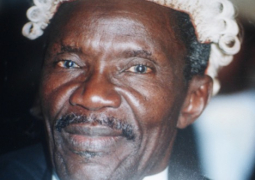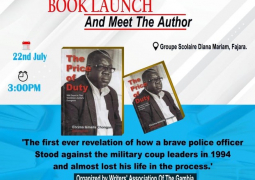President Wade must have won the love and support of the Senegalese people, and as a result, he won the presidential run-off in 2000 against the former president of Senegal , Abdou Diouf, with the support of Mustapha Niasse, who threw his weight behind President Wade.
But President Wade’s troubles started when he parted company with Mustapha Niasse and his other allies. To make things worse, he groomed his son, Karim Wade, so that he would hand over power to him when he wanted to leave the presidency before the end of his term, as alleged by his opponents.
As days passed, hardship hit Senegal. The rate of unemployment rose up and the people of Senegal could not put up with the high cost of commodities. They felt disillusioned. They vented their anger in the local government elections and voted against President Wade’s party. His son, as a result, lost the mayoral election in Dakar.
Fearing that he would lose the presidential election in 2012, President Wade decided to amend the Senegalese constitution from the 51% requirement to be elected president to 25%.
But this did not go down well with the Senegalese people. They protested in the streets and had clashes with the security. The tension was high and President Wade succumbed and withdrew.
If the people of Senegal did not put up resistance against President Wade’s decision to amend their constitution, he would have been elected president in the first-round polls with 34%. It was a bitter test for President Wade.
The 2012 presidential election saw President Wade performing badly. In the 2007 presidential election, he polled 55% in the first round, but in 2012 he was short of 16% in the first round to be elected president.
Edrissa Seck, an opposition leader, did not also perform well in the 2012 election. He came second in 2007 presidential election but in 2012, he was pushed to fifth position. He could not survive the strength of the two old hands, Mustapha Niasse and Ousman Tanor Dieng. Macky Sall was the one who took people by surprise, giving President Wade sleepless nights.
In an interview, Macky Sall urged failed presidential candidates, opposition movements and singer-turned political activist, Youssou Ndour, to back him and complete the process for a new democratic dispensation.
But President Wade was wallowing in political gerrymandering. He had said that his party and its allies would naturally explore all the possibilities of understanding with other political forces. He was an experienced politician. He would try to find his way to get some votes from the opposition. He was cunning and knew how to play his cards. When it came to the worst, he would use money to induce the opposition supporters to vote for him in the second round. In trying times, people find it very difficult to turn their backs on money.
Opposition supporters protested against President Wade’s bid for a third term. Some were injured and others died. Macky Sall challenged him in the streets. “If President Wade behaves like a mad man, we will push aside police barricade and remove him from state house,” President Sall said in a demonstration.
But the Constitutional Council ruled that President Wade could contest for a third term in the 2012 presidential election. President Sall then went to campaign to prepare for the election. He toured almost the entire country as a presidential candidate, and in the end, he won in the second round of voting.
Opposition Leader Ousman Sonko also joined the political arena. He started enlightening the youth. He would tell them the economic situation of their country, the embezzlement of funds by government officials. After he told the youth how a country is governed and how the youth are empowered, they love and believe him. This made him popular and his popularity grows rapidly.
But this did not go down well with the authorities. They charged Ousman Sonko with rape and threatening to kill, following the allegation by Aji Sarr. She said she was pregnant from the rape but after two years, there is no pregnancy. Even the pregnancy of an elephant does not take two years. She was used to frame Ousman Sonko who earlier stated that the allegation was politically motivated and a set-up.
During the first sitting of the case, he went to attend the court proceedings. He was forced by the police to take another route on the court premises but he refused, fearful that he might be assassinated. He was already at the court premises before time. Why forcing him to take a route which he did not want to take.
The authorities arrested him and took him to prison. This angered his supporters who came out to the streets and demonstrated, calling for his liberation; they burnt tyres and destroyed properties. This forced the authorities to release their leader. Fourteen people lost their lives during the scuffle. Ousman Sonko was attacked by the supporters of the ruling coalition when he was on a tour of the country.
He was going to attend the second sitting of the case. The police stopped his car and forced him out and put him into their car. In fact, they broke the windscreen of his car. He accused them of spraying poisonous tear gas on him. As a result, he was hospitalized in a private clinic. A doctor had confirmed that they had used a dangerous substance on him.
The case was adjourned for judgement in the absence of Ousman Sonko. Aji Sarr had testified but was inconsistent in her testimony. Our African sisters should avoid being used by politicians to safeguard their interest.
The judge acquitted Ousman Sonko on the rape and threatening to kill charge but convicted and sentenced him to two years on ‘corrupting the youth’ charge. Ridiculous! Isn’t it?
What was on the charge sheet against Ousman Sonko was rape and threatening to kill. The charge of corrupting the youth was never in the charge sheet. This came up on judgement day. Everybody was taken by surprise. It was a trumped-up charge. It was never before the court. How can you convict somebody of an offence which was not before the judge? What type of law is this? This is really injustice.
Ousman Sonko’s conviction caused the death of 16 people who came out to the streets. They felt that justice was not done to him. In a country where magistrates and judges are dictated to by the executive, you get such verdicts from them. But the evil that men do lives after them.
Read Other Articles In Opinion
Economywatch - BIZFINANCE LEXICON
May 7, 2024, 10:46 AM




